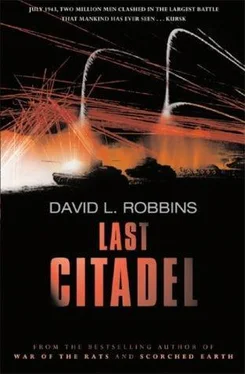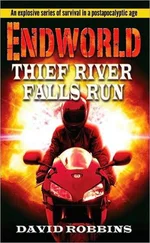She saw boots. Russian boots. And there were jackets and dark civilian shirts, and yes! Filip, and nasty Josef. They’d come!
Katya gulped a deep breath and fought to sit up.
The two leaped away from her, old Filip staggered backward and fell to his knees, crossing himself and muttering to Christ. Josef recovered first, he stepped to her and without a word dug his hands under Anna’s spine to raise the horse off her.
‘Come on, old man,’ he growled at the starosta .
‘Witch?’ old Filip mumbled, still on his knees.
Katya turned to Filip, knowing how ghastly she must look. ‘Filip, help me get up.’
Josef grunted again, ‘Old man.’
Filip helped Josef heft the horse from Katya’s legs. Katya plucked the dangling intestine from her ripped shirt and tossed it aside, callous now for Anna’s death, her sorrow dismissed by the thrill of reprieve. She sucked down air and thought it sweet, blessed it, felt the honey of her own blood rush back into her feet, then reached up for Josef’s hand to stand on her own. Only minutes had passed since the C-3 exploded, that was all, and she had lived a lifetime in them, and a death. She wanted to hug both men, even Josef.
The two left her wobbling while they went to the tracks to collect the German guards. The blown rail was curled in the air like a beckoning steel finger. Josef and Filip hoisted one man to his feet, he’d been unconscious until Josef kicked him to wake him. The soldier’s hands had been tied and his mouth stuffed with a sock. In the moonlight Katya saw the shock on his face, his pupils wide and white at her standing before him, a blood-covered zombie partisan. The other guard did not rise. His throat was slit. The gash was gaping enough in his neck for Katya to see it from where she stood, blood had poured and pooled in the crannies of the gravel and across rail ties. Katya felt nothing at the sight.
Josef held his knife to the bound German’s throat and gripped him under the elbow. He led the soldier away into the hundred open meters between them and cover. The prisoner walked off with his eyes fixed on Katya.
‘ Sei still,’ Filip hissed to him, and drew a index finger under his own chin to make sure the German understood that Josef would kill him if he made a sound.
Filip took Katya under the arm. Together they hurried away behind Josef and the prisoner back to the trees.
‘Where are the horses?’ she asked.
‘Ivan and Daniel got them. They’re waiting. You had a close call, Witch. You scared me so bad I almost filled my britches. Well done. Are you alright?’
She ached down to her marrow, not just from the fall of her horse but from the tempest of fear in her veins; it had withdrawn, but not without leaving its mark in her.
‘Yes.’
Limping across the dark ground on Filip’s arm, she prepared herself for her return to life, to the war and Plokhoi’s partisans, this long night and tomorrow’s day, and her place in it all. Why did the C-3 go off before she was clear? Where was Leonid? Who was the traitor?
How does old Filip know German?
She asked him.
He answered out of breath, lugging her across the open ground. They were almost to the shrubs. Katya spotted the outlines of Ivan and Daniel saddling the remaining horses.
‘My mother was a Sudeten Slav,’ the old man replied. ‘My six brothers and I grew up speaking German.’
‘Did all your brothers come with you to Plokhoi?’
‘Yes.’ The starosta hesitated. ‘All but one.’
‘Where is he?’
‘He stayed in the village. He’s… he’s not welcome.’
Katya slowed, even before reaching the safety of the copse and the other partisans.
‘Why, Filip?’
The starosta’s whisper vented through tight lips, baring shame. ‘Nikolai works for the Nazis. He’s an interpreter. For their interrogations. One day the village… No, my brothers and I, we’ll put a stop to it.’
Katya tugged Filip to a halt. This was a calamity in the old man’s family, a collaborator. She saw shame on Filip’s face, but could not pause for it. She needed to ask something fast, outside the hearing of the others. Of all the partisans, she knew Filip was not the spy.
‘Did he ever question downed Soviet pilots?’
Filip cocked his weathered head at this. ‘Yes. Why?’
A prayer raced through Katya’s heart. ‘Did Nikolai ever travel to Tomarovka?’
‘Last week. They came and took him to Kazatskoe, three kilometers away’
Her heart cartwheeled at this news. Before she could explain, Daniel and Ivan tramped out of the bushes to them. Katya whispered to Filip, ‘Please, don’t tell anybody about this. Talk to me alone. Filip, please.’
‘Yes,’ the starosta beamed, glad at her urgency, he was needed for a secret with the Witch, the bloody partisan woman come back from the dead, ‘of course.’
Daniel and Ivan recoiled when they came close. Daniel gaped at the sight of her. Big Ivan was uncowed, he gathered Katya in his arms.
‘It was Daniel,’ Ivan bent low to her ear, ‘he said it was alright to blow it. I swear.’
‘I heard your horse take off, Witch,’ Daniel said. ‘I didn’t know you were still close to the tracks. The Germans were headed your way. I’m sorry’
‘Shut up,’ Josef barked, with no interest in whispering. ‘Saddle up. Daniel, you ride with the prisoner. Up.’
Daniel made a helpless gesture at Katya, then grabbed the German soldier by the wrists and shoved him onto a horse. Ivan whined, ‘I told him to wait. But the guards got so close. Witch, are you alright?’
Katya moved beside an open saddle. The blood on her face and hands was drying to a rusty cake. She was a resurrection and a fright for the partisans, even Josef winced looking at her. With ease, without pain, she toed the stirrup, rose from the earth, and spurred the new horse away.
July 8
0450 hours
SS Leibstandarte situation room
Belgorod
With every telegram he handled, the partisan’s heart pumped in Luis’s hand. He took the pieces of paper, some yellow, some blue for urgent, and walked them to the map. The battle was a game, fleshless and compact. It was a slow-moving tide, black German markers inching toward the red sandcastles of the Soviet defenders. Luis did not let himself begin to hate what he was doing, presiding over numbers and stratagems, sliding blocks with shuffleboard sticks, breathing tobacco smoke and not the fumes of gunpowder and gasoline. Hatred was a commodity he would not waste on this map room and these clean liverymen of staff around him. He’d nibbled morsels throughout the first and second days of the battle, he’d slept no more than an hour at a time, sometimes on his feet leaning against a wall. He never unbuttoned his collar. He hoarded his hatred, refusing to squander it on wooden armies. The throb in his knife hand reminded him of actions far beyond a paper field and a toy war.
Luis was naive on his first morning beside the map, the opening day of the battle. He did not understand how the black German blocks of Papa Hoth’s 4th Panzer Army could fail to push through the Red ones. The black had everything: air support, momentum, powerful new weapons, expert and experienced leaders at every level. Luis wanted to simply reach down to the map, sweep his arm through the red bits and push them aside, that was what Hoth was certain to do on the battlefield, what was so difficult? Those were Russian blocks, they were the ones that always were defeated, Verdad? But by the end of the first day, he’d read out eight separate messages from the 48th Panzer Corps, fighting on a fifteen-mile front alongside the Oboyan road, to the left of II SS Panzer Corps. The 48th was trying to keep up with the spectacular northward sweep of the three SS panzer divisions; Totenkopf, Das Reich , and Leibstandarte had fought their way thirty-five kilometers from their jump-off positions, north past Smogodino and Luchki, through the Soviet 6th Army’s second defense belt. The 48th’s job was to protect the SS left flank by crossing the Luchanino River and taking Syrtsev and Alekseyevka, then reach the Psel River by nightfall. Eight times Luis watched the black blocks of the 48th charge across the green line of the Luchanino at the little red battalion blocks of the 3rd Mechanized Corps. Eight times, he hid his growing astonishment when the attacks had been repulsed, the red blocks had held, the road to Oboyan remained in Russian control. The reports spoke of flamethrowers and dug-in T-34 positions, of deep echelons of unyielding defenders and close-quarters combat, of dozens of Tigers and Panthers destroying opposing Russian tanks by a score of seven to one throughout the day. Hundreds of Red tanks were wrecked on an afternoon in just one part of the greater battle, and still those Russian blocks held.
Читать дальше












